
Newsletter - Publication 133
15th Aug 2022
|
|

Maersk suspends C&F bookings from Pakistan
International logistics company Maersk told its Pakistani clients on August 12 it’s going to “temporarily suspend” the acceptance of C&F bookings — contracts in which freight is prepaid — with effect from Aug 15. Maersk blamed the “restrictions/limitations” imposed by the State Bank of Pakistan (SBP) on outward freight remittances for putting the freight services provider in a “very difficult situation”. The company said it’ll keep the acceptance of C&F bookings suspended until remittances restrictions are either eased or lifted by the SBP. The company noted that it will continue accepting export bookings on the basis of FOB. The SBP’s move is apparently aimed at restricting the outflow of dollars. The quick depletion of the dollars has brought the local currency under pressure, leaving the country scrambling for greenback supplies from international lenders and friendly countries.
|
|

Engro to start LNG marketing business
Engro Corporation is setting up a gas marketing business in Pakistan along with the New York Stock Exchange–listed Excelerate Energy, a company official told. Engro Eximp FZE, which is a subsidiary of Engro Corporation and serves as the Dubai-based trading arm for the Pakistani conglomerate, will lead the joint effort to establish a re-gasified liquefied natural gas (RLNG) marketing business to open up new fuel supply avenues for private businesses. Pakistan’s domestic gas reserves have been in decline for many years. Natural gas production has also gone down at an annualised rate of 2.2 per cent for five years. The gas sector regulator believes the shortfall will soon be close to two billion cubic feet per day (bcfd). The average winter demand is 6.5-7bcfd. Pakistan State Oil Company Ltd uses Engro Elengy Terminal to import gas under long-term contracts while Pakistan LNG Ltd brings spot purchases through GasPort LNG Terminal. When a new terminal — either FSRU or land-based — is developed, (it) will also make available capacities for utilisation by multiple private parties. The upcoming LNG terminals — Qatar-backed Energas LNG and Mitsubishi-backed Tabeer LNG — will have capacities of 750-1,000mmcfd each. Given the capacities of already operational Engro Elengy (690mmcfd) and GasPort LNG (750mmcfd), the addition of the two “merchant” terminals will more than double the country’s re-gasification capacity.
|
|
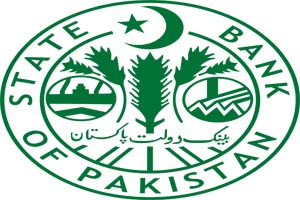
SBP relaxes rules for importers
Pakistan’s central bank relaxed rules for imports as it reduced the requirement for advance payments by traders to 25% at the time of initiating an import order compared to 100% in the past three months.Banks were required to maintain 100% cash margin against certain (177) items of import, regardless of the duration of deferred import payment. “In this regard, it has been decided to relax the 100% cash margin requirement where the credit terms of import are more than 90 days,” the State Bank of Pakistan (SBP) said in a notification. Accordingly, banks would acquire 25% import payment in advance on 177 items, if they are scheduled to make deferred import payment in 91 to 180 days from the time of placing an import order (opening of Letter of Credit - LC). Traders are required to submit zero import payments in advance, if their import payments are due after 181 days from the time of initiating an import order. Earlier, the central bank had increased the amount of advance payments to 100% in April. The instructions were supposed to last till December 31, 2022.
|
|

Govt to limit imports for next 3 months: Miftah Ismail
Finance Minister Miftah Ismail said that the government would control imports for the next three months, even if it came at the cost of slower growth. "I will not allow imports to increase for three months and, in the meantime, we will come up with a policy. I understand that growth will be reduced for a bit but I have no other choice," he said while addressing a ceremony at the Pakistan Stock Exchange (PSX). The finance minister noted that the government's import restrictions would affect the automobile and electronic appliances industries. He said he did not want to create unemployment and his first priority was the reduction of imports. "When there was pressure, we imported a lot of oil and gas. At this time, we have stock of 30 days for diesel and petrol. We have furnace oil supply for six months. We are very comfortable in terms of our energy security and energy supply, and other obligations. We will control imports for the next four months." The minister pointed out that the country's import bill in June was $7.7bn and if the current account deficit widened to such an extent, it would create pressure on the rupee. Pakistan's import bill for the previous fiscal year stood at $80bn while its exports amounted to $31bn. "No country can grow and be stable with this kind of current account deficit."
|
|
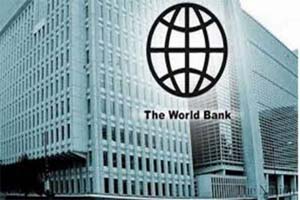
World Bank blocks $335m loans
In the middle of a serious economic crisis, the World Bank has cancelled or withheld a $335 million concessionary loan quota for Pakistan after Islamabad failed to empower the debt office and could not harmonise the sales tax and property valuation procedures. The Washington-based lender’s decision has put a question mark over the ability of Pakistani policymakers and bureaucrats, who have not been able to take corrective measures and lost claim over the cheaper loans. Yet the finance minister approached the US for help to expedite the policy loan approvals despite his ministry’s failure to implement the required conditions. Official documents showed that the World Bank cancelled an allocation of $188 million for Pakistan for the just-ended fiscal year. The lender withheld another $147 million quota that it otherwise would have allocated in the new fiscal year, had Pakistan been able to meet the agreed conditions, according to the documents. The development has taken place at a time when the country is not able to access the international capital markets and the foreign commercial banks for getting loans due to the deteriorating economic conditions. In such conditions, the lender cancelled the loans that carried only 2% interest rate and had a 30-year repayment period. The International Development Association (IDA) – a concessionary arm of the World Bank – had introduced the new Sustainable Development Finance Policy (SDFP) from July 2020 as part of the international community’s efforts to help IDA countries manage the rising public debt vulnerabilities and risks. To draw these concessionary resources, every country has to implement at least three performance and policy actions, known as PPAs, under the SDFP framework. Pakistan can recover this set-aside at the beginning of FY24 upon satisfactory implementation of outstanding PPAs. But if implementation of the FY22 PPAs in FY23 remains incomplete, this amount will also be permanently discounted.
|
|

Pakistan's exports to China expected to reach $4b
Pakistan’s exports to China have reached an 11% increase in the first half of 2022 and with this momentum it is likely to reach $4 billion by the end of this year. The exports to the neighbouring country crossed $1.918b in the first half of this year, up by 10.97% from $1.728b in the same period compared to the previous year. It continues to increase on yearly basis, as per the official data from the General Administration of Customs of the People’s Republic of China (GACC). According to the State Bank of Pakistan (SBP), the country exported goods worth $2.78b during the 12 months of fiscal year 2021-22 against the exports of $2.04b during the same year, showing an increase of 36.08%. An economic expert stated that, “China has opened up its market for Pakistani goods. The two countries can benefit from long-term relationships and Pakistani traders can export more goods to China, which is the second largest economy in the world.” He also added, “Pakistan can also become a food basket for China because the Chinese market is huge and has good purchasing power, therefore Pakistan should take advantage of its good relationship and China can help relocate its industries and technologies to Pakistan, resulting in an increase of exports to not only China but to the world”.
|
|

Govt plans oil pricing on daily exchange rate
The government has decided in principle to change the pricing mechanism for petroleum products and narrow down its period to cater for the fast changing currency exchange rate and minimise losses of oil marketing companies (OMCs) and refineries. The government has also given a commitment to the OMCs to increase their margins on sale of petroleum products on a par with dealers who have secured 43 per cent increase in margin on petrol and 70pc on high speed diesel (HSD) to Rs7 per litre each with effect from August 1. The OMCs have now enhanced their demand for margins at Rs9 per litre to compensate for higher taxation impact. Top government officials said a recent meeting between government officials and Pakistan State Oil (PSO), concluded that the existing pricing mechanism put in place in July 2020 had become ineffective after a steep depreciation of the rupee against the dollar in recent months. On the policy agenda is also the question of decreasing the price adjustments on a weekly or daily basis instead of the existing fortnightly basis or letting the industry set their own prices after fixing of various taxes by the government at the start of each month. The regulator would be asked to monitor the pricing mechanism in the market on the basis of set factors to avoid disorderly pricing by market players.
|
|
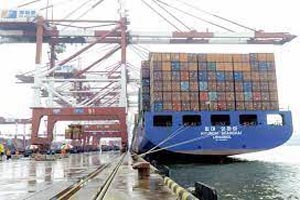
After 22 months, exports tumble 24pc in July
The country’s exports of merchandise entered a negative growth in July after 22 months when the economy recovered from the impact of Covid-19. The export proceeds fell 5.17 per cent to $2.21 billion in the first month of the current fiscal year from $2.34bn in the corresponding month last year, data from the Pakistan Bureau of Statistics showed. On a month-on-month basis, the export proceeds tumbled by 23.95pc indicating a downward trend in the export sector. Last time, the exports posted a negative growth of 14.75pc in August 2020. In FY22, for the first time, not only the export target was achieved but it exceeded the psychological barrier of $30bn. Pakistan’s exports remained below this level for the last decade. Pakistan’s exports increased 26.6pc to $31.845bn in the just-ended fiscal year, up from $25.160bn a year ago. Exports grew 6.48pc to $2.89bn in June, up from $2.72bn in the previous year. The textile sector has already complained about the rising cost of energy and raw materials mainly due to massive rupee depreciation. Moreover, exporters have also complained about refunds that stuck with the Federal Board of Revenue.
|
|

Import bill shrinks
The import bill also dropped by 12.81pc to $4.86bn in July from $5.57bn over the corresponding month of last year. On a month-on-month basis, the import bill dipped by 38.31pc. In June alone, the import bill edged up to $7.74bn from $6.28bn over the same month last year, reflecting an increase of 23.26pc. The decline in July will reduce pressure on the rupee-dollar exchange rate. The import bill increased 43.45pc to $80.51bn during 2021-22, up from $56.12bn a year ago. Taking to Twitter Finance Minister Miftah Ismail said “Our efforts to reduce imports have finally borne fruit. Imports in July, per PBS data, were only $4.86b compared to $7.7b in June. Given that we have pulled Pakistan back from the brink of default, he further claimed. “Our government is determined to minimise the large current account deficit left by PTI”, the minister further remarked.
|
|
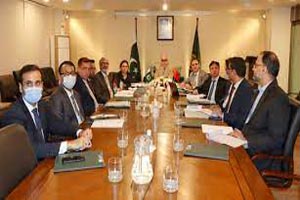
Maiden meeting of Pak-China JWG on IT held
The maiden meeting of Pakistan-China Joint Working Group (JWG) on the Information Technology industry was virtually held at the Ministry of IT and Telecommunication. The Pakistani side was led by Ministry of IT and Telecommunication Additional Secretary (Incharge) Mohsin Mushtaq, while Vice Minister of Industry and IT of China, Zhang Yunming represented the Chinese side, said a news release. The meeting discussed avenues for cooperation between the two countries in the information and communications technology (ICT) sector. Addressing the meeting, Additional Secretary (Incharge), MOITT, Mohsin Mushtaq said that both Pakistan and China would benefit from the Joint Working Group as well as from the initiatives which would be completed under this relationship. “This new Joint Working Group on IT under the CPEC will open exciting opportunities for Pakistani tech companies, and facilitate launching of 5G technology in Pakistan,” he added. The meeting was attended by Additional Secretary MoITT, Aisha Humera Moriani, Member International Coordination, Ajmal Anwar Awan and other senior officers of the Ministry.
|
|
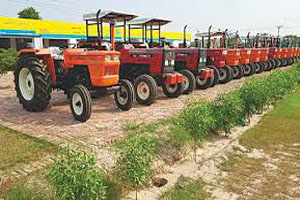
Tractor production increase 16.01% in FY 2022
The production of farm tractors in the country witnessed an increase of 16.01 percent to 58,880 units during the twelve months of fiscal year 2021-22, against the production of 50,751 units in same months of last year. During the period under review, the production of trucks also witnessed an increasing trend as it went up from 3,808 units as compared to 5,659 units, showing an increase of 48.60 percent, according to Pakistan Automobile Manufacturing Association (PAMA) revealed. Production of pickups, Light Commercial Vehicle (LCVs) and Jeeps also rose by 42.96 percent to 44,421 units during the fiscal year under review from 31,072 units during fiscal year of last year. Similarly, the production of buses witnessed an increase of 15.96 percent from 570 units to 661 units during the period under review, PAMA added.
|
|
|

© 2022 Alpine Marine Services Private Limited
all rights reserved
|
|